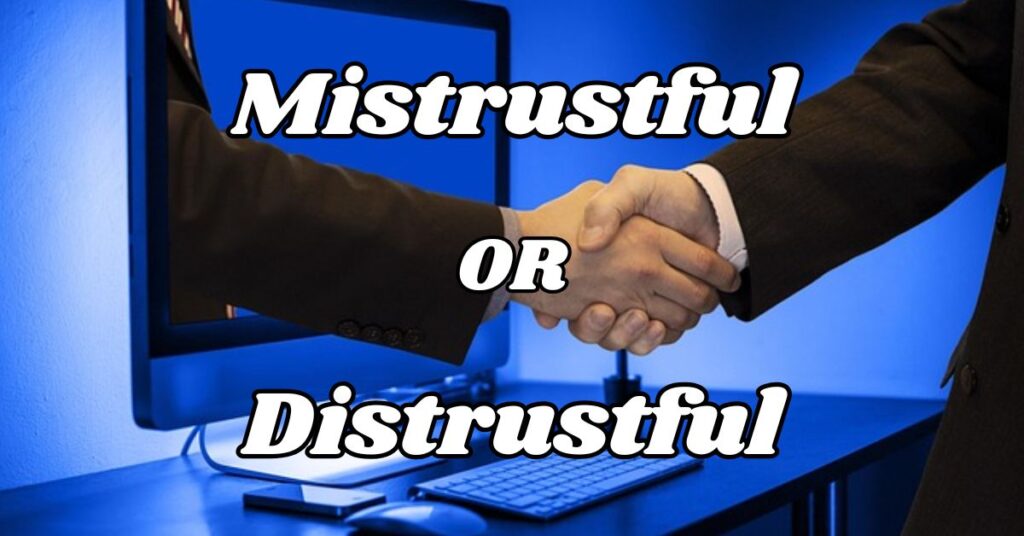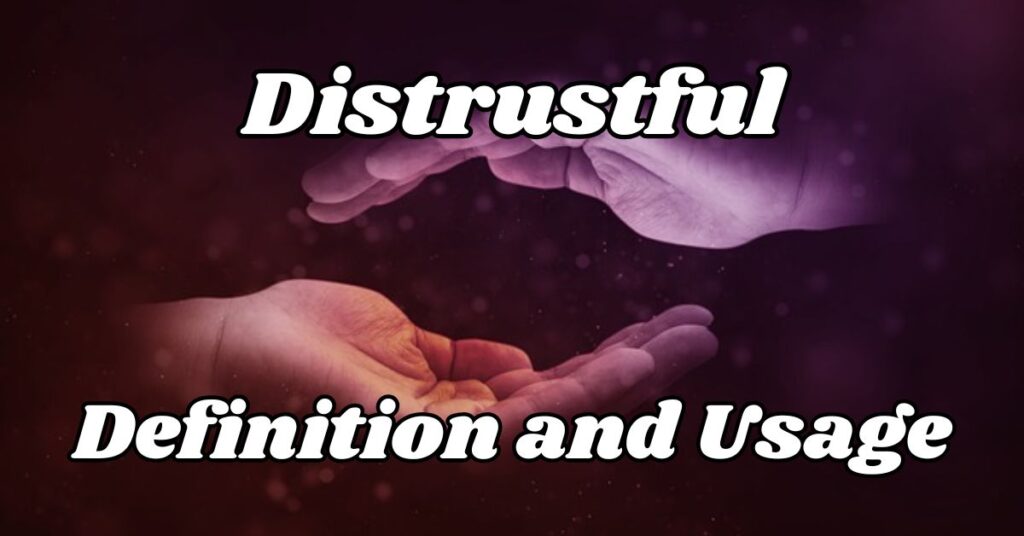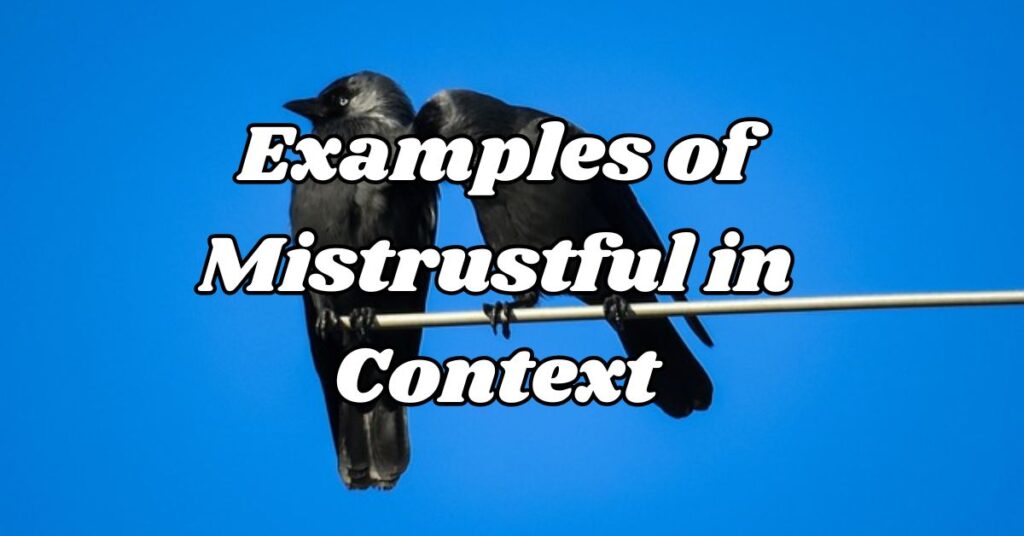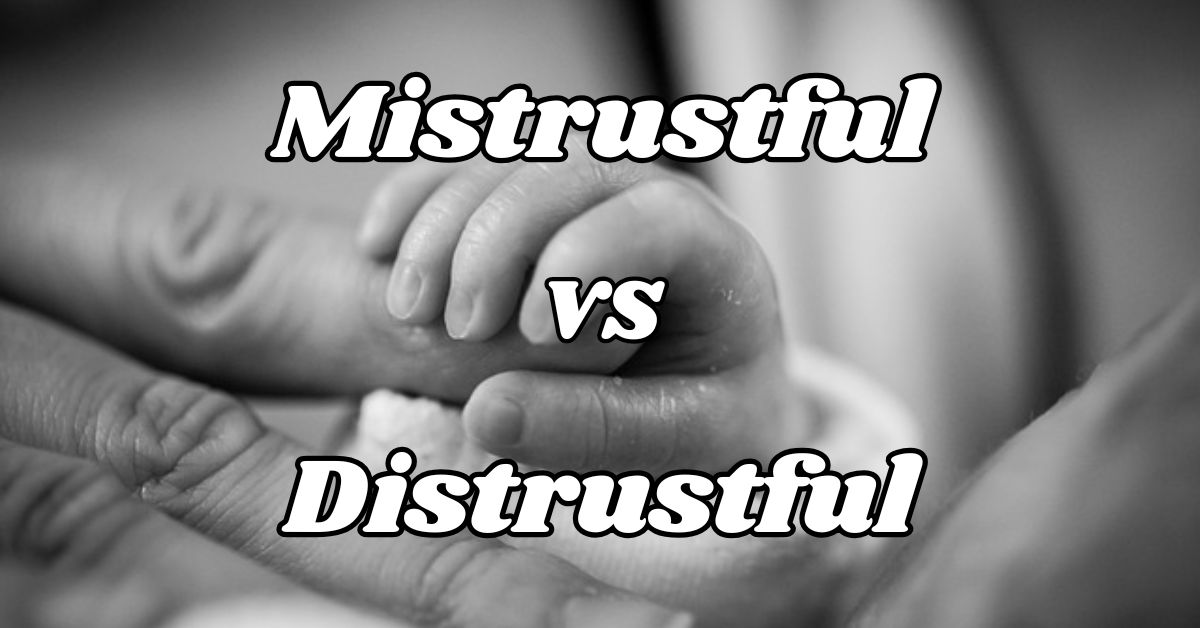Mistrustful vs Distrustful: these two words, while often used interchangeably, possess distinct meanings that subtly alter the context of skepticism. Understanding this difference is crucial for precise communication.
This article delves into the nuances of mistrust or distrust, exploring the etymological roots of each term and illustrating their proper usage through practical examples. We’ll examine mistrustful meaning and contrast it with distrustful meaning, clarifying when to use “mistrustful” versus “distrustful.”
Furthermore, we will explore synonyms for mistrust and synonyms for distrust, enriching your vocabulary and enhancing your ability to express nuanced levels of skepticism. This exploration of distrust vs mistrust will empower you to communicate with greater accuracy and clarity, fostering better understanding in your interactions.
Quick Summary
“Mistrustful” describes a general feeling of doubt or suspicion about someone’s reliability, often based on intuition or assumptions. It suggests a disposition to be wary of others. “Distrustful,” conversely, implies a lack of trust in a specific person or thing, typically due to past experiences or known information.
The key difference lies in the scope: mistrust is general, and distrust is specific. Understanding this distinction is crucial for clear communication.
Understanding Mistrustful or Distrustful

The concepts of trust, mistrust, and distrust are fundamental to human interaction. Trust, at its core, is a belief in the reliability, truth, or ability of someone or something. Mistrust, conversely, represents a general lack of trust or a tendency to be suspicious, while distrust signifies a lack of trust in a specific person or thing.
Understanding this core difference is crucial to correctly using “mistrustful” and “distrustful.” This understanding also involves exploring the origins of these words.
Origins of the Word Trustful
“Trustful,” meaning trustworthy, dates back to the mid-15th century, derived from “trust” and “-ful.” Its later meaning, “full of trust,” emerged in 1832. “Trustless,” meaning unworthy of trust or distrustful, appeared in the 16th century.
These words highlight the evolution of trust-related vocabulary over time.
Origins of the Word Mistrustful
“Mistrust,” meaning lack of confidence or suspicion, and “mistrustful,” both emerged in the late 14th century. “Mistrust” derives from “mis-” (badly) and “trust.” The verb “mistrusten,” also from the late 14th century, meant to doubt or suspect, combining “mis-” with “trust” (verb).
These terms highlight the historical understanding of mistrust as a negative or flawed form of trust.
Mistrustful: Definition and Usage

“Mistrustful” is an adjective describing a person’s general tendency to lack trust or be suspicious. It suggests a personality inclined to doubt the motives and intentions of others, even without concrete evidence.
A mistrustful person might be generally wary, hesitant to believe what others say, or prone to suspect hidden agendas. This trait can influence their relationships and interactions.
Mistrustful Meanings
The meanings associated with “mistrustful” encompass a range of related concepts. It suggests a general lack of faith in the goodness or reliability of others. A mistrustful person might be cynical, apprehensive, or guarded in their interactions.
They may question the motives of those around them, even without concrete evidence. This tendency can stem from personality traits, past experiences, or a general worldview. Understanding these related meanings is crucial for accurate usage.
Mistrustful Usage
“Mistrustful” is used to describe a person’s character or a situation characterized by a lack of trust. For example, “He was a mistrustful man, always suspicious of strangers.
” It can also describe an atmosphere: “The air in the room was thick with a mistrustful silence.” The word emphasizes a general tendency toward doubt and skepticism.
Uses of Mistrustful in a Sentence
- He was mistrustful of strangers.
- The atmosphere in the office was mistrustful after the layoffs.
- Her mistrustful nature made it difficult for her to form close relationships.
- The detective had a mistrustful look on his face.
- She felt mistrustful of his promises.
Synonyms of Mistrustful
- Suspicious
- Skeptical
- Wary
- Doubtful
- Dubious
- Incredulous
- Cynical
- Apprehensive
- Guarded
- Leery
Distrustful: Definition and Usage

“Distrustful” describes a lack of trust in a specific person, thing, or entity. It suggests a targeted skepticism, often based on past experiences or concrete information. A distrustful person might have reason to doubt someone’s reliability, honesty, or competence.
This lack of trust is directed at a particular target, unlike the more general skepticism implied by “mistrustful.” Context is key to understanding the specific reason for distrust.
Distrustful Meanings
“Distrustful” suggests a lack of confidence in someone’s reliability, honesty, or competence. It can imply doubt about their intentions or abilities. This feeling often stems from specific experiences or information that has eroded trust.
It’s a more targeted form of skepticism than “mistrustful,” focusing on a particular object of distrust.
Uses of Distrustful in a Sentence
- She was distrustful of his intentions.
- He was distrustful of the car’s brakes.
- The investors were distrustful of the new CEO.
- She became distrustful after he lied to her.
- They were distrustful of the government’s promises.
Synonyms of Distrustful
- Doubtful
- Dubious
- Incredulous
- Skeptical
- Suspicious
- Wary
- Hesitant
- Uncertain
- Unconvinced
- Chary
Side by Side Comparison
| Feature | Mistrustful | Distrustful |
| Scope | General lack of trust | Lack of trust in a specific person or thing |
| Focus | Disposition, character | Specific person, thing, or situation |
| Basis | Often based on personality or general outlook | Often based on experience or information |
Vocabulary Use of Mistrustful or Distrustful
“Mistrustful” describes a general tendency to be suspicious, while “distrustful” indicates a specific lack of trust. “Mistrustful” often reflects a personality trait, while “distrustful” usually stems from a particular situation or relationship.
Using the correct word ensures clarity and avoids misrepresenting the nuance of skepticism.
Everyday Usage Examples
Everyday usage examples illustrate how “mistrustful” and “distrustful” are applied in real-world scenarios. They help to understand the subtle differences in their connotations and how context influences their use.
For instance, saying “He’s mistrustful of politicians” implies a general skepticism towards that group. However, “She’s distrustful of her neighbor” suggests a specific lack of trust due to a particular reason, perhaps a past disagreement. These examples highlight the nuances of each word.
Examples of Mistrustful in Context

- His mistrustful nature made him a difficult business partner.
- She was mistrustful of the new employee’s eagerness.
- The king was mistrustful of his advisors.
- A mistrustful glance was all she needed to convey her feelings.
- The mistrustful atmosphere in the room was palpable.
Examples of Distrustful in Context
- I am distrustful of his promises after he broke the last one.
- She was distrustful of the bridge’s stability.
- He became distrustful of his friend after the betrayal.
- The company was distrustful of the competitor’s claims.
- They were distrustful of the witness’s testimony.
Tips to Remember the Differences
- Think of mistrustful as a personality trait, a general lack of trust.
- Think of distrustful as a specific reaction to a person or thing.
- “Mis-” suggests a general negativity, aligning with the broader scope of “mistrustful.”
- “Dis-” often implies a separation or lack of connection, relating to the specific nature of “distrustful.”
- Consider the context: Is the lack of trust general or specific?
You May Also Like: Procceed vs Proceed: Which One is Correct
FAQS: Mistrustful vs Distrustful
What does it mean if someone is mistrusting?
It means they have a general tendency to be suspicious and lack trust in others, often based on intuition rather than concrete evidence.
How do you deal with mistrustful people?
Be consistently reliable and honest, communicate openly, and avoid behaviors that could be perceived as deceitful, while respecting their need for caution.
Who is a distrustful person?
A distrustful person lacks trust in a specific individual or entity, usually due to past negative experiences or perceived breaches of trust.
Conclusion
Understanding the difference between mistrustful vs distrustful hinges on scope. Mistrustful describes a general disposition of skepticism, while distrustful indicates a lack of trust in a specific entity. Recognizing this distinction allows for more accurate communication.
While both terms express a lack of trust, the target of that distrust is what sets them apart. By employing the correct term, you can convey your meaning with precision, avoiding ambiguity and fostering clearer understanding in your interactions.
Mastering this nuance enhances your communication skills and promotes more effective dialogue.
Related Post: Targetted vs Targeted: What’s the Difference?

